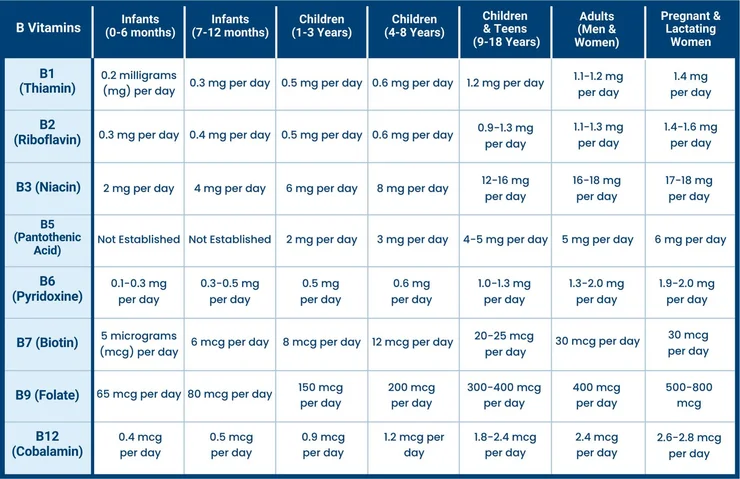Health
If You Have Dry Lips, You May Be Deficient in This Vitamin
September 20, 2023
Dry, chapped, and cracked lips can be an uncomfortable and sometimes painful experience. Just talking, laughing, or smiling can result in itching, redness, burning, or even bleeding. If you find yourself constantly reaching for that lip balm, the problem may be more than skin-deep.
In this blog, we uncover what vitamin deficiencies might be linked to your dry, chapped lips.
Can Vitamin Deficiencies Cause Chapped Lips?
Surprisingly, yes! Dry and cracked lips are not only uncomfortable but could also indicate an underlying issue that cosmetics can't fix. If you've been struggling with persistently dry and chapped lips and have tried every balm, salve, and ointment to no avail, it may be time to look within—literally.
The solution to your parched lips might come down to a vitamin deficiency. So let’s dig into what types of vitamin deficiencies can lead to this persistent problem and uncover how you can obtain a pain-free smile and hydrated lips once and for all.
Which Vitamin Is Good for Dry Lips?
While many factors can contribute to dry lips, vitamin deficiency is probably the least suspected cause (1). That said, it can be one of the most serious.
Your dry lips may just be one symptom indicating that your body isn’t absorbing vitamins as it should—or that your diet isn’t providing the vitamins your body sorely needs.Certain conditions can also impact nutrient absorption, meaning some people may absorb vitamins more efficiently than others
So, which vitamins and minerals are the culprits here? Let’s take a closer look.
B Vitamins
Considering there are eight B vitamins that our body needs—but can’t store—it’s easy to become deficient in them if you’re not consistently consuming a variety of food sources daily. In particular, chapped lips may arise from a deficiency in vitamin B2 (riboflavin), vitamin B9 (folate), vitamin B6, or vitamin B12 (2, 3, 4, 5).
This is largely because these vitamins play an important role in tissue repair, including the repair of lip tissue (6).
If we become deficient in these vitamins, the body can’t repair the lips as efficiently. This means other factors, like the environment, weather, or dehydration, can have an even bigger impact, leaving our lips dry and chapped.
Individuals with digestive issues or disorders, such as Crohn’s disease or celiac disease, might be particularly vulnerable to this type of deficiency (3). Additionally, those following a vegan or vegetarian diet might also be susceptible to this vitamin deficiency since B vitamins are largely found in animal products.
If your blood tests come back indicating a B vitamin deficiency, your doctor may recommend supplementation. However, you can also obtain more B vitamins through your diet by eating eggs, meat, leafy greens, seeds, dairy products, and legumes.
Here’s a complete list of B vitamins and the Recommended Daily Allowance (RDA) of each:

Iron
Iron is essential for adequate energy and the breakdown and utilization of food (7). On top of this, it also plays an essential role in wound healing and overall skin health (8).
Studies indicate that an iron deficiency can lead to inflamed and dry lips, also known as angular cheilitis (9). It can also cause brittle nails and fatigue, indicating its importance in overall health.
Usually, your doctor will recommend supplementation when an iron deficiency is detected. This is because it’s imperative that these levels don’t drop too low, as it can lead to further health complications (think: extreme fatigue, headaches, and even heart problems).
If you’re concerned about your iron levels, you can also incorporate more iron-rich foods like shellfish, spinach, liver, red meat, legumes, quinoa, and pumpkin seeds into your regular diet.
According to the National Institutes of Health (NIH), the Recommended Daily Allowance (RDA) for iron is the following:
Infants
- 0-6 months: 0.27 milligrams (mg) per day
- 7-12 months: 11 mg per day
Children
- 1-3 years: 7 mg per day
- 4-8 years: 10 mg per day
- 9-13 years: 8 mg per day
Adolescents & Adults
- Males 14-18 years: 11 mg per day
- Females 14-18 years: 15 mg per day
- Males 19 years and older: 8 mg per day
- Females 19-50 years: 18 mg per day
- Females 51 years and older: 8 mg per day
Pregnancy
- Pregnant adolescents (14-18 years): 27 mg per day
- Pregnant adults (19 years and older): 27 mg per day
Lactation
- Lactating adolescents (14-18 years): 10 mg per day
- Lactating adults (19 years and older): 9 mg per day
Zinc
Zinc is important for overall oral health, digestion, immunity, skin health, development, and more (10, 11). Symptoms of a zinc deficiency may include dry or chapped lips, decreased immunity, hair loss, diarrhea, and skin ulcers (12).
For dry lips, zinc vitamin deficiency can inevitably play a major role. Thus, it’s essential to get enough zinc. Some examples of zinc-rich foods include seeds, nuts, eggs, dairy, oysters, and red meat.
According to the National Institutes of Health (NIH), the Recommended Daily Allowance (RDA) for zinc is the following:
Infants
- 0-6 months: 2 milligrams (mg) per day
- 7-12 months: 3 mg per day
Children
- 1-3 years: 3 mg per day
- 4-8 years: 5 mg per day
- 9-13 years: 8 mg per day
Adolescents & Adults
- Males 14 years and older: 11 mg per day
- Females 14-18 years: 9 mg per day
- Females 19 years and older: 8 mg per day
Pregnancy and Lactation
- Pregnant adolescents (14-18 years): 12 mg per day
- Pregnant adults (19 years and older): 11 mg per day
- Lactating adolescents (14-18 years): 13 mg per day
- Lactating adults (19 years and older): 12 mg per day
What Else Can Cause Chapped Lips?
With dry lips, vitamin deficiency isn’t the only cause. The following things could be at play too:
- Dehydration: Ensure you drink enough water each day, especially if you work up a sweat or it's a particularly warm day. A good guideline to follow is drinking half your body weight in ounces of water per day. So if you’re 150 pounds, you’ll want to drink 75 ounces of water. If you are highly active, you will require at least another 15-20 ounces.
- Sun Damage: Too much sun exposure doesn’t just burn and damage the skin; it also can burn and damage your lips. Don’t forget to apply SPF on the lips as well as exposed skin when spending long durations outdoors.
- Eczema: Unfortunately, eczema flare-ups can also occur to the lips, leaving them dry and inflamed.
- Contact Dermatitis: Lip irritation can occur due to common products, like toothpaste, or even common foods, like cinnamon.
- Licking the Lips: Picking your lips or constantly licking them can actually lead to increased irritation and dryness.
As previously mentioned, dry lips could also indicate other health conditions are at play. For instance, Crohn’s disease and thyroid problems can also lead to chapped lips.
If you’ve experienced persistently dry lips for weeks or months on end, it might be time to book an appointment with your doctor to uncover the root cause and rule out any serious conditions.
Krista Bugden
Krista Bugden
Medical Disclaimer
This content is for informational and educational purposes only. It is not intended to provide medical advice or to take the place of such advice or treatment from a personal physician. All readers/viewers of this content are advised to consult their doctors or qualified health professionals regarding specific health questions. Neither Dr. Chad Walding nor the publisher of this content takes responsibility for possible health consequences of any person or persons reading or following the information in this educational content. All viewers of this content, especially those taking prescription or over-the-counter medications, should consult their physicians before beginning any nutrition, supplement, or lifestyle program.



